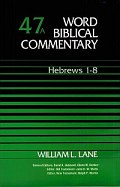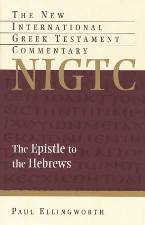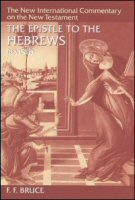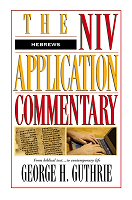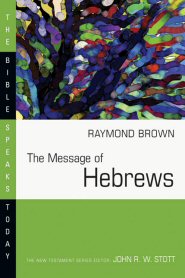Best Resources on Hebrews
"The first-century audience of Hebrews was experiencing opposition to their faith in Jesus and facing pressure to give up. The writer reassures them that everything they seek can be found in Christ. Hope in Christ is so much better than what society has to offer. Once their entire lives are transformed in Christ, the believers can withstand any persecution the world throws their way.
The author of Hebrews is unknown, and the audience is not clearly identified. Some early Christians grouped this letter among Paul’s writings; others suggested authors in the early Church, including Barnabas, Luke, and Clement of Rome."
—Faithlife Study Bible, Lexham Press
Everything You Need to Study & Teach Hebrews
Expository Preaching Kits are curated resources all focused on helping you teach a single book of the Bible—keeping you prepared without weighing you down.
Best commentaries on Hebrews
William L. Lane, Word Biblical Commentary (WBC), Thomas Nelson, 1991, 372 pp.
This commentary provides an interpretation of the book of Hebrews in conversation with the rapidly growing body of scholarly literature. Acknowledging that many issues such as authorship and provenance remain open, William Lane examines the evidence available and makes a compelling case for his reading of the book and its historical background.
- Level: Advanced
- Type: Technical
Paul Ellingworth, New International Greek Testament Commentary (NIGTC), Eerdmans, 1993, 862 pp.
Paul Ellingworth begins his study of the epistle to the Hebrews with a detailed study of the Greek text before working outward to consider the wider context, linguistic questions, and the relation of Hebrews to other early Christian writings and to the Old Testament. Nonbiblical writings such as Philo and the Dead Sea Scrolls, though less directly related to Hebrews, are considered where appropriate.
- Level: Advanced
- Type: Technical
F. F. Bruce, New International Commentary on the New Testament (NICNT), Eerdmans, 1990, 448 pp.
The last volume on which Bruce was able to complete revisions before his death in 1990, this edition of The Epistle to the Hebrews evidences 25 years of further study on Bruce’s part—especially through thoroughly updated and embellished footnotes that take into account the numerous publications on Hebrews that have appeared in the intervening years. Bruce also replaced the commentary’s use of the American Standard Version of 1901 with his own translation of the original Greek text to make his verse-by-verse exposition as clear as possible.
- Level: Intermediate
- Type: Expository
George H. Guthrie, NIV Application Commentary (NIVAC), Zondervan, 1998, 480 pp.
Hebrews covers diverse topics—from Christ’s priesthood to the faith of prominent biblical figures. In this volume on Hebrews, George H. Guthrie brings the diversity of themes in Hebrews together and shows how Hebrews is not only theologically significant but also has something to say to the Church today.
- Level: Intermediate
- Type: Devotional
Raymond Brown, Bible Speaks Today (BST), InterVarsity Press, 1982, 311 pp.
Times were hard for the first readers of the letter to the Hebrews. Many had been exposed to fierce persecution. They had been assaulted, their homes had been plundered, and some had even been cast into prison. To such people this letter came as an encouragement. The writer of the letter turns their eyes to Christ, shows how he fulfills the hope expressed in the Old Testament sacrifices, and calls his readers to a steadfast faith that will take them through the hard times they now face. Such encouragement and challenges are never without relevance to Christians. Raymond Brown demonstrates this clearly in his passage-by-passage exposition.
- Level: Basic
- Type: Devotional
Best Books on Hebrews
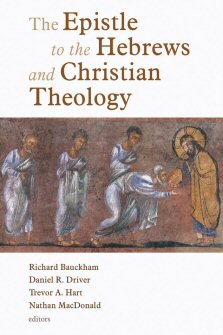
The Epistle to the Hebrews and Christian Theology
The second annual St. Andrews Conference on Scripture and Theology brought leading biblical scholars and systematic theologians together in conversation, seeking to bridge the growing gap between these disciplines. Reflecting the convergence of the Old Testament’s cultic theology, Hellenistic ideas, and early Christian thinking, the epistle to the Hebrews provides a perfect foundation for this fruitful dialogue.
Learn more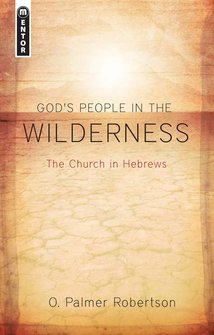
God’s People in the Wilderness: The Church in Hebrews
For the writer to the Hebrews, the Church of today finds its most proper definition in terms of the historical experience of the old covenant people of God “in the wilderness” during the days of Moses. For him, the Church is God’s people in the wilderness. His unifying perspective on this vital question of the Church’s self-definition provides fresh insight into the nature of the Church—an insight that has the promise of reviving and redefining the life of Christ’s people even today. Rooted in the redemptive experience of the old covenant people of God, this life-shaping self-definition may provide much-needed aid to the confused state of churches in Christ for the twenty-first century. Palmer Robertson will help us consider the nature and mission of the people of God in today's world as defined by Hebrews.
Learn more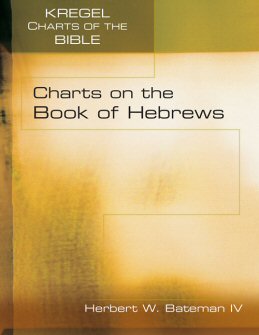
Charts on the Book of Hebrews
The book of Hebrews presents interpretive challenges and theological comparisons unrivaled in the New Testament. Charts on the Book of Hebrews puts this demanding yet rewarding information in an accessible and useful format. The charts fall into four categories: introductory, influences, theology, and exegesis.
Learn more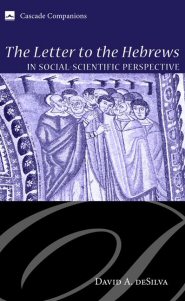
The Letter to the Hebrews in Social-Scientific Perspective
David deSilva explores Hebrews through a social-scientific lens, asking one of the most important questions when interpreting letters and sermons: What was going on in the community to occasion such a response? DeSilva looks for clues concerning the anonymous author, his education level, the influence of the Greek environment, and his perception of his own authority. In addition, by forming a social profile of the audience that includes location, ethnicity, and class status, deSilva brings to light the author’s aims of helping protect Christian converts from persecution and social shame.
Learn more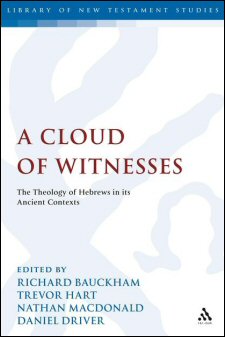
A Cloud of Witnesses: The Theology of Hebrews in its Ancient Contexts
A Cloud of Witness examines the theology of the book in the light of its ancient historical context. There are chapters devoted to the structure of Hebrews, the person of Jesus Christ, Hebrews within the context of Second Temple Judaism and the Greco-Roman Empire, and the role of Hebrews in early Christian thought.
Learn moreBest Courses on Hebrews
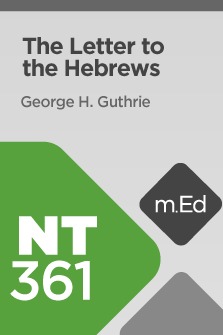
Mobile Ed: NT361 Book Study: The Letter to the Hebrews (10 hour course)
This course is the culmination of over 20 years of research and teaching on the book of Hebrews by Dr. George Guthrie. Dr. Guthrie walks you through the entire text, explaining its complex structure and navigating you through its twists and turns. You’ll learn about specific issues the first-century Church faced and see how we are still dealing with those issues today. You’ll also gain an understanding of the theological foundations laid in Hebrews. Dr. Guthrie draws from his extensive research to provide insight on the priesthood of Jesus and God’s covenant promises.
Learn more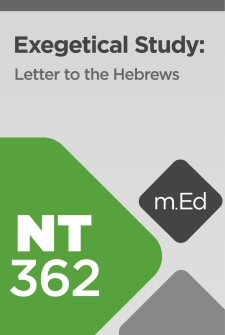
Mobile Ed: NT362 Exegetical Study: Letter to the Hebrews (15 hour course)
In Exegetical Study: Letter to the Hebrews, Dr. David deSilva takes an in-depth look at the sermon to the Hebrews. He sets the stage for careful exegesis by providing a solid foundation of background information that probes cultural, theological, and spiritual issues throughout the sermon. He then walks through the text, which is divided thematically into eleven units, concluding each section with a summary and challenges for application. DeSilva also explores this text as a model for preaching today.
Learn more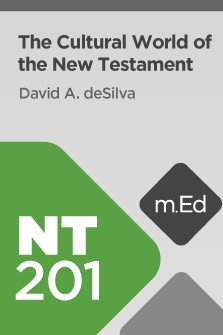
Mobile Ed: NT201 The Cultural World of the New Testament (6 hour course)
Join Dr. David deSilva as he describes important cultural concepts from the first century and shows how these concepts shed light on the New Testament. Learn why the author of 1 Peter spoke to the shame Christians were experiencing and what cultural norms they had to fight against as they sought to follow Christ. Discover how grace and gratitude were viewed differently than they are today. Learn what purity meant for Jews, how patronage and reciprocity impacted everyday decisions, how families and households operated, and more. Dr. deSilva pulls from a variety of sources to explain these concepts and uses the books of Hebrews and 1 Peter to illustrate them.
Learn more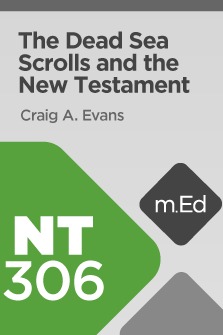
Mobile Ed: NT306 The Dead Sea Scrolls and the New Testament (5 hour course)
Dr. Craig Evans combines his extensive knowledge of ancient manuscripts and New Testament studies to survey the contents, context, and influence of the Dead Sea Scrolls. He details the history of the scrolls and the Essenes and also shows how the scrolls affect our understanding of Jesus, John the Baptist, and the early Church.
Learn more